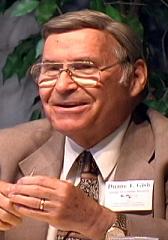Duane Gish facts for kids
Quick facts for kids
Duane Gish
|
|
|---|---|
 |
|
| Born |
Duane Tolbert Gish
February 17, 1921 White City, Kansas, U.S.
|
| Died | 5 March 2013 (aged 92) San Diego, California, U.S.
|
| Education | University of California, Los Angeles (BS) University of California, Berkeley (MA, PhD) |
| Employer | University of California, Berkeley Cornell University Institute for Creation Research |
| Known for | Prominent public speaker on creationism |
| Military career | |
| Allegiance | |
| Service/ |
|
| Years of service | 1941–1945 |
| Rank | Captain |
| Battles/wars | World War II |
| Awards | Bronze Star Medal |
Duane Tolbert Gish (born February 17, 1921 – died March 5, 2013) was an American biochemist. He was a well-known member of the creationist movement. Gish believed in Young Earth creationism, which is the idea that the Earth is only a few thousand years old. He worked as a vice-president at the Institute for Creation Research (ICR). He also wrote many books and articles about what he called "creation science."
Many people called Gish "creationism's T. H. Huxley." This was because he enjoyed having public discussions, called debates. He often debated with important evolutionary biologists at universities. People who watched his debates often liked his way of speaking.
Contents
About Duane Gish's Life
His Early Life and Studies
Duane Gish was born in White City, Kansas. He was one of nine children and had a twin brother. He served in World War II as a captain. He received the Bronze Star, a military award.
After the war, Gish went to college. He earned a Bachelor of Science degree from the University of California, Los Angeles in 1949. In 1953, he received his Ph.D. in biochemistry from the University of California, Berkeley. He then worked as a researcher at Berkeley. He also taught as a professor at Cornell University Medical College. Later, he joined the Upjohn Company as a research scientist.
His Work on Creationism
Duane Gish was a Christian from a young age. He believed that the Genesis creation narrative from the Bible was a true historical event. In the late 1950s, he read a booklet that made him think science showed problems with the idea of evolution. He also thought science supported the Genesis story.
In 1971, Gish joined the faculty at San Diego Christian College. He then moved to the Institute for Creation Research (ICR). The ICR became an independent organization in 1981. Gish wrote several books and articles supporting creationism. His most famous book was Evolution: The Fossils Say No!, published in 1972. Many creationists consider this book an important reference.
When he passed away on March 5, 2013, Gish was a Senior Vice-President Emeritus at the ICR.
Public Debates and Discussion Style
Duane Gish was well-known for his public debates. He often debated with scientists who supported evolution. His opponents said he used a fast-paced style during debates. He would present many arguments and change topics quickly.
The "Gish Gallop"
Eugenie Scott, who leads the National Center for Science Education, called this style the "Gish gallop." She described it as a way for a creationist to speak for a long time. They would share many points that an opponent could not possibly answer in the debate time. She also said Gish sometimes did not answer questions from his opponents. This phrase is now used to describe similar debate styles. It can refer to people who support other ideas, like homeopathy or Moon landing hoaxes.
Gish's View on Debates
However, Gish also said similar things about his own debate opponents. He accused some, like Kenneth R. Miller, of speaking very fast. He said they brought up so many points that he could not answer them all.
Critics also noted that Gish often used the same presentation in many debates. For example, he would use similar opening statements and jokes. Massimo Pigliucci, who debated Gish five times, said Gish ignored evidence that went against his beliefs.
See also
- Flood geology
- Monty White
 | William Lucy |
 | Charles Hayes |
 | Cleveland Robinson |

